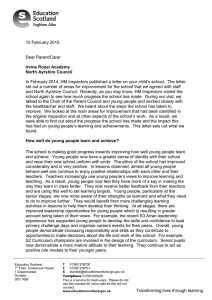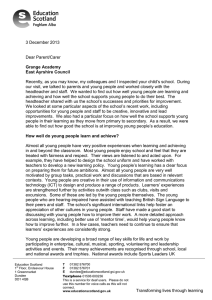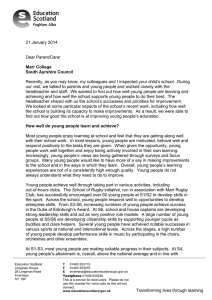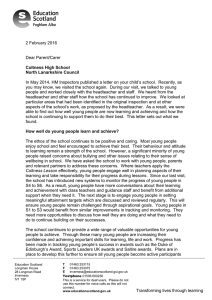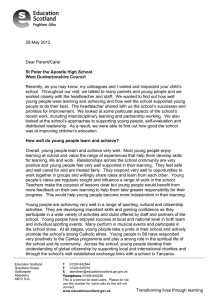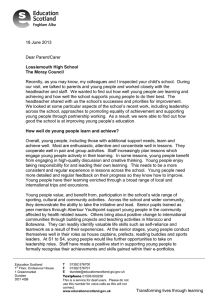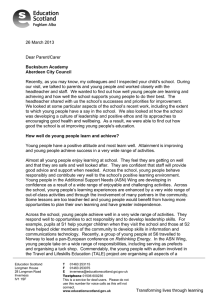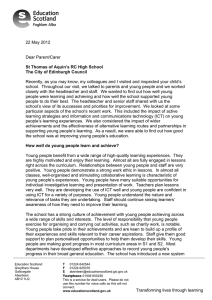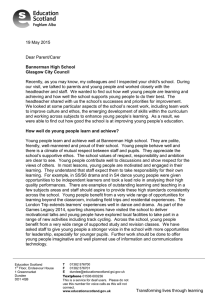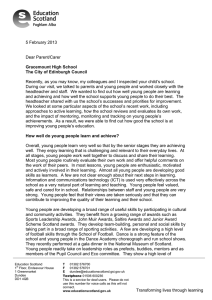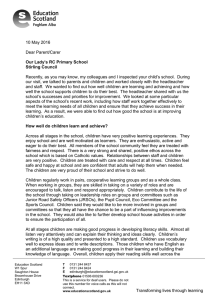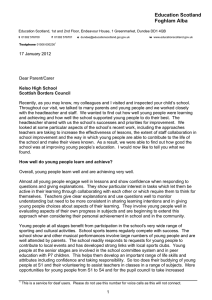25 November 2014 Dear Parent/Carer ’s school. During
advertisement
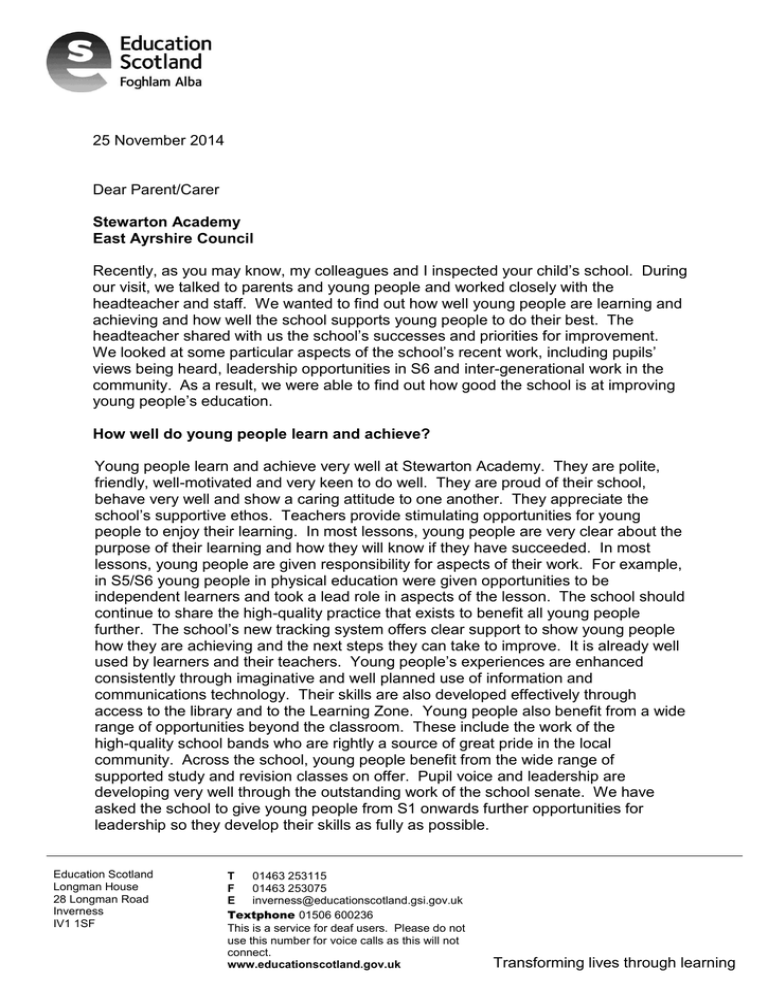
25 November 2014 Dear Parent/Carer Stewarton Academy East Ayrshire Council Recently, as you may know, my colleagues and I inspected your child’s school. During our visit, we talked to parents and young people and worked closely with the headteacher and staff. We wanted to find out how well young people are learning and achieving and how well the school supports young people to do their best. The headteacher shared with us the school’s successes and priorities for improvement. We looked at some particular aspects of the school’s recent work, including pupils’ views being heard, leadership opportunities in S6 and inter-generational work in the community. As a result, we were able to find out how good the school is at improving young people’s education. How well do young people learn and achieve? Young people learn and achieve very well at Stewarton Academy. They are polite, friendly, well-motivated and very keen to do well. They are proud of their school, behave very well and show a caring attitude to one another. They appreciate the school’s supportive ethos. Teachers provide stimulating opportunities for young people to enjoy their learning. In most lessons, young people are very clear about the purpose of their learning and how they will know if they have succeeded. In most lessons, young people are given responsibility for aspects of their work. For example, in S5/S6 young people in physical education were given opportunities to be independent learners and took a lead role in aspects of the lesson. The school should continue to share the high-quality practice that exists to benefit all young people further. The school’s new tracking system offers clear support to show young people how they are achieving and the next steps they can take to improve. It is already well used by learners and their teachers. Young people’s experiences are enhanced consistently through imaginative and well planned use of information and communications technology. Their skills are also developed effectively through access to the library and to the Learning Zone. Young people also benefit from a wide range of opportunities beyond the classroom. These include the work of the high-quality school bands who are rightly a source of great pride in the local community. Across the school, young people benefit from the wide range of supported study and revision classes on offer. Pupil voice and leadership are developing very well through the outstanding work of the school senate. We have asked the school to give young people from S1 onwards further opportunities for leadership so they develop their skills as fully as possible. Education Scotland Longman House 28 Longman Road Inverness IV1 1SF T 01463 253115 F 01463 253075 E inverness@educationscotland.gsi.gov.uk Textphone 01506 600236 This is a service for deaf users. Please do not use this number for voice calls as this will not connect. www.educationscotland.gov.uk Transforming lives through learning Across the school, young people are achieving a broad range of skills for life and work by participating in valuable enterprise activities, sports activities and cultural events. For example, in inter-house events, young people achieve in a range of netball, basketball and football. They understood other cultures through visits to a Buddhist Centre and a Hindu Temple. Notable numbers of young people gain other accredited awards, for example, Dynamic Youth awards, Dance Leader awards, Saltire awards and S6 Leadership awards. These awards are ensuring increased opportunities for young people to have their achievements recognised and are helping young people prepare well for the world of work. Young people gain skills in performance through their involvement in various music groups and from public performances such as the Christmas Concert and School Show. Young people with additional needs progress to a positive destination. The school is continuing to develop its tracking of all young people’s achievements to ensure they all benefit from a broad and varied education. From S1 to S3, most young people are making good progress across all curriculum areas, including literacy and numeracy. From S4 to S6, the school is making very good progress in improving young people’s attainment. By S4, increasing numbers of young people are attaining a literacy and numeracy award at National 4 and National 5 level or equivalent. By S6, young people build well on their prior attainment, including those who attain to the highest level in the Scottish Baccalaureate. Almost all young people are successful in moving on to employment, training or further learning on leaving school. Almost all young people with additional support needs are making good progress in their learning. The school has made a good start to involving young people in assessing aspects of their own health and wellbeing. How well does the school support young people to develop and learn? The school is very well resourced to support young people to develop and learn, for example through the high number of very effective classroom assistants. Most teachers plan their lessons very well and choose tasks that are relevant and interesting for young people. The range of strategies used includes appropriate differentiation of materials and setting clear individualised targets. In most lessons, the pace of learning is suitably brisk. This helps to meet young people’s learning needs very effectively. In the best examples, for example modern languages, lessons are well-planned with very good opportunities for active learning and challenging activities. In a few classes, young people experience a level of challenge either too great or not sufficient for them. Staff should continue to improve consistency in pupils’ progress. The school has highly effective approaches to support the pastoral needs of all young people. All young people benefit from helpful opportunities to discuss their progress and consider their next steps with a key adult who knows them very well. They feel very well supported through homework clubs, study revision, mentoring and buddying. The school has strong links with partner agencies such as social workers and a variety of health professionals who help to meet the needs of a range of young people with particular needs. The curriculum is based on Curriculum for Excellence principles and the school’s vision of offering learning that is motivating. Teachers continue to plan and develop the curriculum to provide young people with the knowledge, skills and attributes that will lead to high achievement. Young people have opportunities to learn through a broad range of subjects, a range of personal achievements and a few opportunities for 2 working across subjects. From S1 to S3, young people receive a broad general education. Staff are aware that the development of literacy, numeracy and health and wellbeing are the responsibility of all and plan learning accordingly. The school should continue to develop the broad range of partnerships with business and the community. This will ensure young people continue to make strong progress in their learning at all stages, and have an increasingly flexible range of opportunities for study from S4 to S6. The school should develop further its programme of short courses to ensure that they support deeper learning and challenge. How well does the school improve the quality of its work? In the short time he has been in post, the new acting headteacher is emerging as an effective leader who is keen to achieve the highest standards of learning and teaching, building on the work of the previous headteacher. He is already very well respected by the school community including parents, staff and pupils. The acting headteacher is supported by a senior management team whose enthusiasm and drive is helping to take the school forward. Staff contribute to the school’s very positive ethos and play a key role in school improvement. There are examples of outstanding learning and teaching in the school and all staff should aspire to reach this high standard. Teachers carefully consider the effectiveness of their teaching and regularly make improvements to their practice. They contribute to school and departmental improvement plans. They work with senior leaders regularly to analyse examination results. Principal teachers and senior leaders visit classes to observe and support learning and teaching. All these approaches are ensuring on-going improvements in young people’s experiences and achievements. Parents are beginning to play a bigger part in school improvement. This work should continue to be developed further. Teachers work together regularly to develop new ideas. As a result, the school is very well placed to continue to improve. This inspection found the following key strengths. Polite, friendly and well-behaved young people, who enjoy their learning in a supportive and very caring environment. The strong leadership of the new acting headteacher, senior management and the active contribution of staff to the very positive climate for learning. The impressive achievements of young people in a wide range of activities across the school. The school’s approaches to improving its work through very effective analysis of pupil data and the use of self-evaluation. A wide range of partnerships which enhance learners’ experiences. We discussed with staff and East Ayrshire Council how they might continue to improve the school. This is what we agreed with them. Continue to develop the curriculum in line with Curriculum for Excellence principles. Continue to improve attainment. 3 What happens at the end of the inspection? We are satisfied with the overall quality of provision. We are confident that the school’s self-evaluation processes are leading to improvements. As a result, we will make no further visits in connection with this inspection. As part of its arrangements for reporting to parents on the quality of education, East Ayrshire Council will inform parents about the school’s progress. Aileen Monaghan HM Inspector Additional inspection evidence, such as details of the quality indicator evaluations, for your school can be found on the Education Scotland website at http://www.educationscotland.gov.uk/inspectionandreview/reports/school/primsec/Stew artonAcademyEastAyrshire.asp If you would like to receive this letter in a different format, for example, in a translation please contact the administration team on the above telephone number. If you want to give us feedback or make a complaint about our work, please contact us by telephone on 0141 282 5000, or e-mail: complaints@educationscotland.gsi.gov.uk or write to us addressing your letter to the Complaints Manager, Denholm House, Almondvale Business Park, Livingston EH54 6GA. 4
